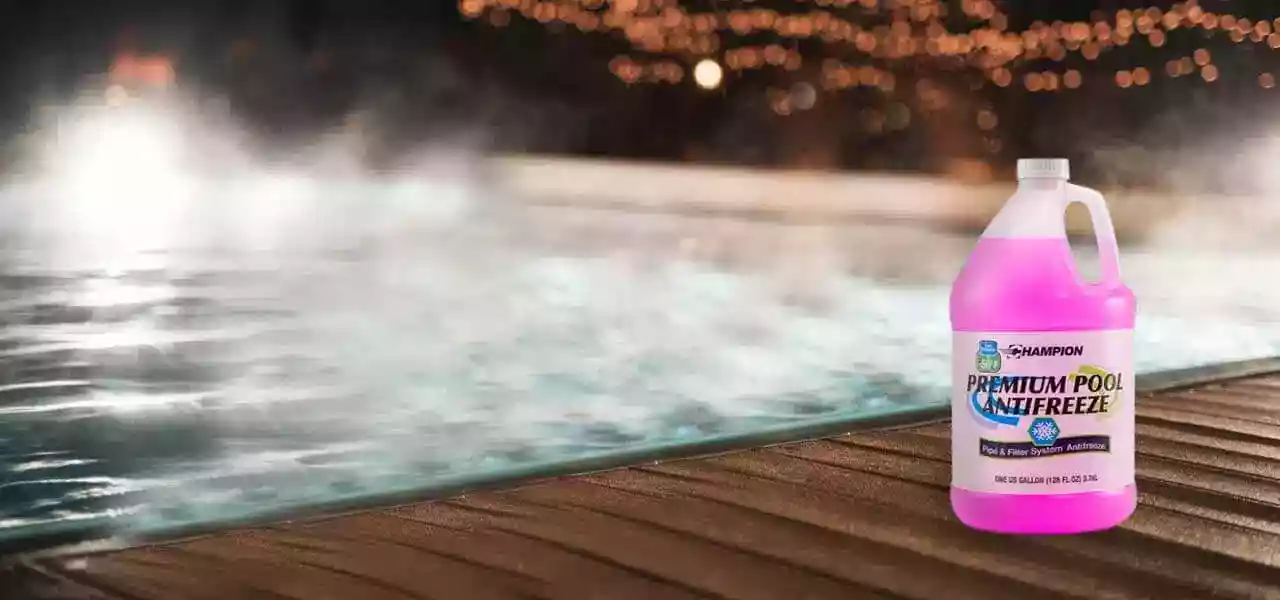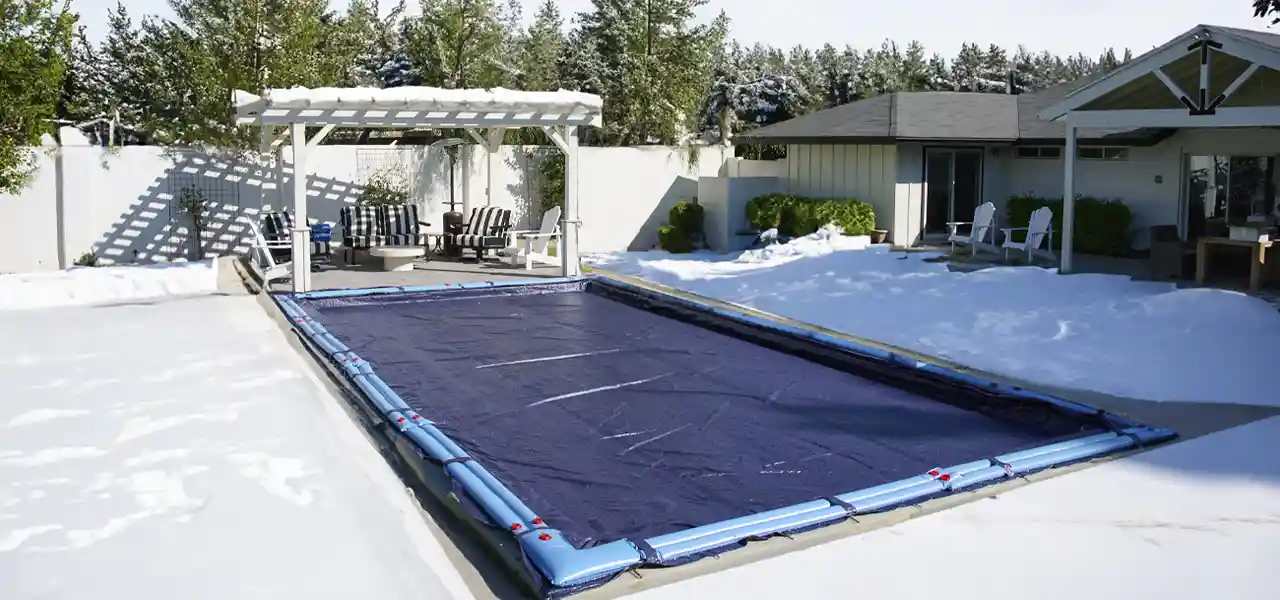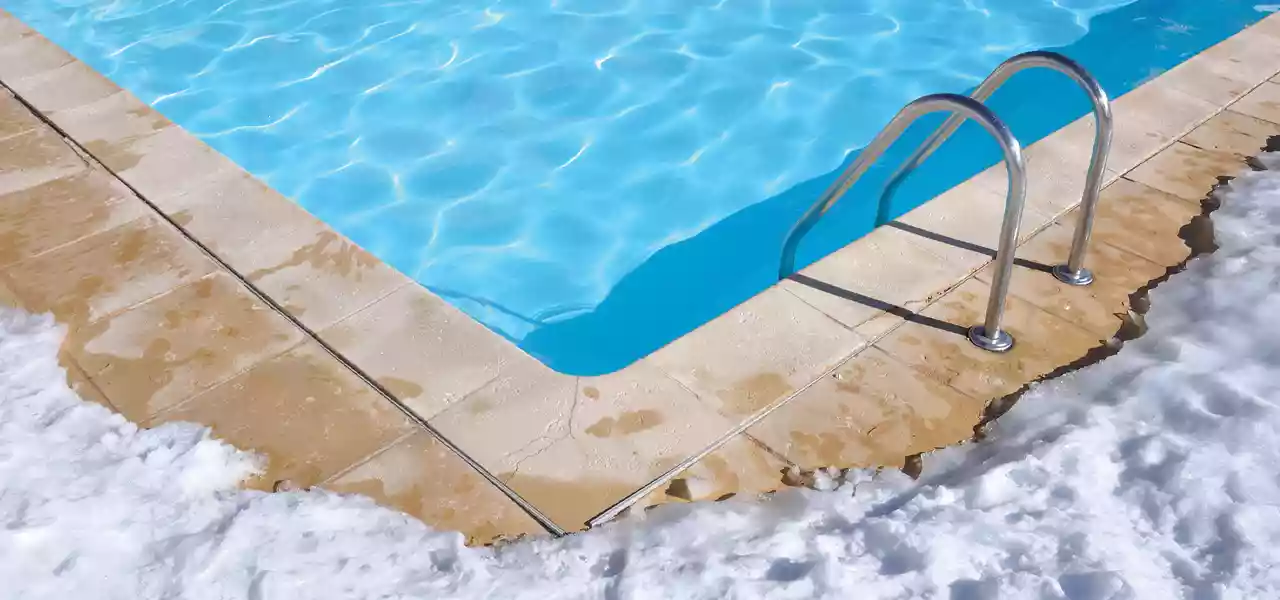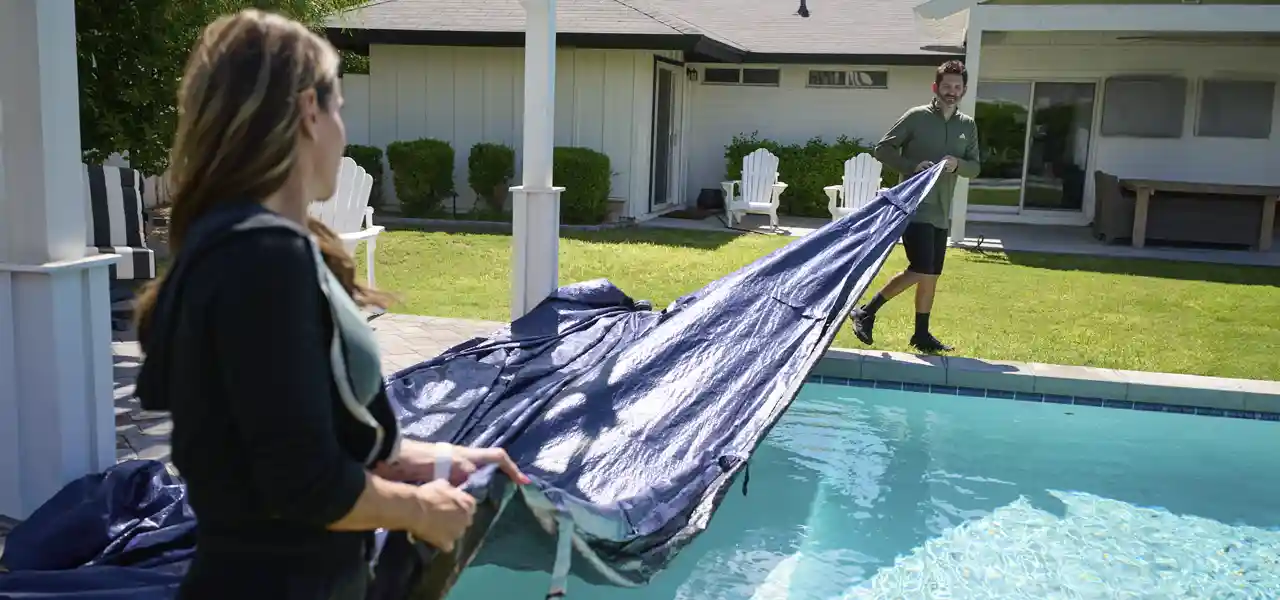
Before we begin, it’s important to note that vehicle antifreeze is NOT the same as swimming pool antifreeze. The antifreeze you use in your car is toxic, while pool antifreeze is non-toxic and perfectly safe to swim in the water.
Now that we’ve cleared that up, let’s discuss what pool antifreeze is and why you should use it in your pool!
Q: Is Swimming Pool Antifreeze Necessary?
A: No, using pool antifreeze is not necessary! That is, as long as you blow out all the water from your pool pipes. As the name implies, pool antifreeze is used to prevent water from freezing in the plumbing pipes. Therefore, properly blowing out the water in the pipes will eliminate the water, as well as the need for antifreeze.
However, many people use antifreeze as additional insurance against faulty plugs, or if you’re not certain all the water has been blown out. Pool antifreeze won’t damage your pool, so even if you’re sure you blew out all the water, it’s not a bad idea to still use a bit.
Q: How Much Swimming Pool Antifreeze Should I Use?
A: Most manufacturers recommend 1 gallon of pool antifreeze for every 10 feet of water-filled pipe. Use less antifreeze if you blew out all, or some, of the water in your pipes. Always refer to the dosing instructions on your container of pool antifreeze.
Q: How Do I Add Swimming Pool Antifreeze?
A: Lower your pool’s water level to the winter closing level, and pour the antifreeze into the skimmer. To use it in the return line, cleaner line, or main drain line, use a section of garden hose with a funnel, and insert the hose from the pump or from a partially disassembled valve.
Q: Can I Pour it on Pool Equipment?
A: Don’t pour pool antifreeze directly on pool equipment. The salts and glycol within the antifreeze react negatively to the metals and rubber of your pool equipment. Antifreeze also reacts dangerously with chlorine, so avoid putting any in your chlorinator.
Q: Can I Pour it Directly Into the Pool?
A: We know the name says “pool” antifreeze, but believe it or not, you should not use it in your pool. It would take gallons upon gallons of antifreeze to prevent your pool from freezing. Pool antifreeze is for the pipes, not for the pool.
For above ground pools, use an air pillow to break up ice sheets that form in the pool. Alternatively, partially fill a few milk jugs with pebbles and pool antifreeze for the same effect.
Q: Will Swimming Pool Antifreeze Protect a Main Drain Line?
A: Antifreeze can potentially protect a main drain line, but remember that antifreeze is heavier than water, and it will seek the lowest level in the pipe. If your main drain pipe has a steady pitch, as many do, you may notice the antifreeze coming out of the main drain, into the pool shortly after adding it.
Q: Will Swimming Pool Antifreeze Harm the Pool Water?
A: Nope! It’s specifically non-toxic and doesn’t pose a threat to swimmers or water chemistry.
Q: Can I Use Automotive Antifreeze?
A: NO! Ethylene Glycol is extremely toxic to people, and should never be used in your pool or pool pipes. If possible, always purchase pool antifreeze from designated pool supply stores, not from local grocery stores. That way, you won’t have to worry about accidentally buying automotive antifreeze.
Make sure the bottle is labeled swimming pool antifreeze, which contains propylene glycol.
Q: Are There Multiple Types of Pool Antifreeze?
A: There are — propylene glycol and a calcium based one. Propylene glycol, which is usually hot pink, is the most common type of pool antifreeze. The calcium-based version is much less popular and hard to find in stores.
Q: Will Pool Antifreeze Harm Animals?
A: Non-toxic pool antifreeze is not harmful to animals unless they ingest it. If your pet consumes any pool antifreeze, contact your veterinarian immediately. While they will likely have a mild reaction to it, it’s better to be safe than sorry. Especially if you don’t know how much your pet ingested.
Q: Should I Pour Pool Antifreeze in the Skimmer After Plugging the Hole?
A: Don’t pour pool antifreeze in the skimmer after applying a skimmer plug. Doing so makes a scummy mess come spring, and it can attack rubber plugs, or the o-ring for threaded skimmer plugs. The better solution is to fill a quart or gallon bottle with pea gravel and/or antifreeze, and drop it in the skimmer after plugging the hole. Using a piece of heavy plastic under the skimmer lid can help keep rain water from dripping into the skimmer during winter.
There you have it, the most common questions for everything pool antifreeze related! We know we sound like a broken record, but this is extremely important: Pool antifreeze is NOT the same as automotive antifreeze. Pool antifreeze is non-toxic and will not harm swimmers, but automotive antifreeze is highly toxic and should never be used in your pool or pool equipment.





I put pool antifreeze in the pool water! Please help. so upset. It is above ground pool about 15 feet round
Hi Paula, I’ll bet you’re not the first person to ever do that! It is non-toxic and non-staining, and there may be little to worry about. It will smell bad, but that will wear off over winter. In the spring, just be sure to give it a good shocking, and that should break apart what’s left of it. Enzymes may be used also, like Pool Magic or Pool Perfect.
Thanks, all cleared up. I just wanted to bring something to your attention that might help other homeowners. I decided that cost of having someone fix your pool open and close was getting pretty costly so been doing it on my own last couple of years. Including Plumbing for new heater filter and pump thought I had everything down pat to know about keeping your pool running. Could not figure out why I couldn’t Purge all the air out of my system when it started running and that’s why I had it on filter instead of filter to waste because of that problem. I finally figured out that there was an air leak at a couple of the unions for the lines that you could hardly even notice. After pouring water over them and noticing in Rush of air and water I was able to seal all the unions which are relatively old and it took care of the problem. I kept thinking there was a leak which I always think is water but everything was dry on the new fittings to my filter and pump and finally figured out it was a air intake problem that was causing the issues. Took me a day to figure it out but everything is running much better now that I’ve sealed up any areas that air can be leaking into the system from. Only reason I bring this up is I don’t see too many blogs on any sites about air leaking from fittings because most people think the water will leak out if there is a break in a seal that’s not true. Sometimes breaking these old unions will cause more problems because you’ll never get it sealed back the right way without replacing valves and unions. I used water putty and silicone in some spots but all unions are sealed and the air problem is fixed
Thanks Larry, yes air leaks can occur anywhere BEFORE the pump impeller, including valves and unions, or even loosely glued PVC joints. Jandy valves can leak air around the valve stem that sticks up thru the cover. Pumps most often leak air (suck in air), at the threaded pipe that screws into the front of the pump, and around the pump lid o-ring. Using shaving cream around suction side joints, can help determine if they are leaking, when you see divots being sucked-in. A Drain King can also be used from the skimmer, with a plug in front of the pump, to pressurize the entire suction manifold – and what you see dripping (or spraying) water while under pressure, is an air leak while under suction.
I was not able to Prime my pool pump so to backwash any anti-freeze when opening, so I had to run on recirculate and ended up blowing a lot of antifreeze into the pool. The pool was perfectly clear when opening and turned cloudy after blowing antifreeze into it. Used my normal pool opening chemicals. My question is will the water clear up on its own or should you pump some out and put clean water in
Hi Larry, that happens – it’s OK, assuming that you used non-toxic pool antifreeze there is no concern. Water should clear-up on it’s own. You could shock the pool again, or use Clarifier to help improve clarity, if needed.